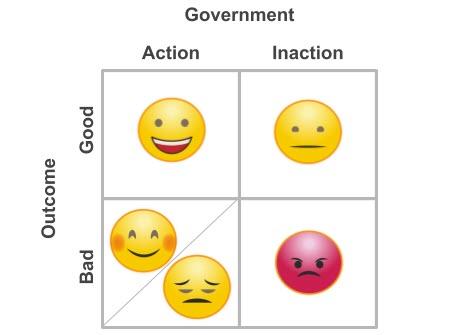Why The Political Class Freaked Out
Authored by Robert Wright via The American Institute for Economic Research,
It’s unsurprising that governments around the world have reacted so strongly to COVID-19. I think the game-theoretic model below explains the first round nicely. It also provides insight into what round two might look like.
For game theory aficionados out there, I am not saying that this is the best way to model the world. I think, though, it is the way most politicians and their advisors think.
Round one is a game against nature with uncertainty (no known or even knowable probabilities) so it basically pits some outcome, “good” (few deaths) or “bad” (many deaths), against government “action” (doing something) or “inaction” (doing nothing). The dominant strategy for politicians is clearly “action” because the outcomes for them (yes, I’m assuming a public choice framework) are better than “inaction” in either state of the world, “good” or “bad.”
Specifically, if politicians do not act and the novel coronavirus burns out, like some epidemiologists argue it would anyway, the world is pretty much unchanged and a “serious crisis” is left unexploited.
If politicians remain inactive and the stench from the crematoria make the living long for death themselves, well, then, there will be hell to pay at the polls, or the poles.
If politicians act and the outcome is good, they can take credit and campaign on it for re-election, as many former military officers on both sides did by “waving the bloody shirt” of the Civil War for decades afterwards. A big win in other words.
If they act and the outcome is bad (i.e. if lots of people die) and again this is round one of the way politicians think, they can always portray it as a (comparatively) good come out with the refrain that “it’s a good thing we did something or this would have been much worse.” Some people will accept, while others reject, the validity of the statement—probably along party lines, so the expected outcome is better than in either of the two inaction squares.
Our political system selects for cunning sorts, so politicians, including the President, try to adjust expectations about what a “good” or “bad” outcome would look like. They had incentives to jump on the worst-case scenarios in those now infamous early epi models, which The Atlantic has kindly recently told us were never meant to be correct.
Thus ends round one, with most of the world in the lower left hand quadrant, under house arrest minus the ankle bracelets.
But now round two has started and it is confusing politicians because the actions taken in round one have created a new kind of bad outcome, output collapse so severe it itself will cause death.
The rather daft assumption that throwing bailout money at the economy would minimize the impact of widespread lockdowns was shattered immediately by overwhelming empirical evidence (see coverage by AIER’s own Robert Hughes). So shrewder politicians, like Andrew Cuomo began to backpedal, as have the more astute progressive news outlets like The New York Times.
Politicians will be hesitant, though, to sound the full retreat bugle because that sets them up to be blamed for the potential bad economic times ahead and for “doing nothing” about COVID-19. Look for rational politicians, instead, to retreat to places like South Dakota and Sweden that implemented sensible policies short of lockdown early on and that, so far, are working. Politicians in both places will be able to credibly blame any local economic problems on “the other guys” while basking in the warm glow of below-projected deaths and relatively well-protected civil liberties.
Look, also, for some “cover” to justify the move. Epidemiologists say that blood tests will soon be available to estimate “the denominator”: the number of people who have already been infected. That will quickly give them a much better idea of how deadly the novel coronavirus actually is and where America is along the curve towards herd immunity. With an effective antibody test in hand, we won’t have to solicit volunteers to return to work, we will know who can return to life as usual without fear of contracting COVID-19, or of spreading it to others. We can also potentially treat those who get sick with the blood of those who naturally fought off the virus. And with production of ventilators and PPE gearing up, this crisis will eventually abate.
At that point, the game will get really interesting because most voters will still see America in the bottom left quadrant with quite a few deaths but also a struggling economy. And in an election year no less! Oh, the spin machines will remain in high gear, noting that in per capita terms things were not that bad, that the death toll was due to the usual suspects of capitalism, socialism, Obamacare, stripped down Obamacare, etc.
But, to borrow a phrase James Carville made infamous in 1992, the 2020 election will be about the stupid economy, Stupid. If it rebounds strongly, incumbents may have a chance. If it doesn’t, well, look at the model again but in a new light. Now inaction on the economy means hell to pay if the economy doesn’t bounce back and the status quo if it does. Action could lead to a lifetime of victories because “Remember when I saved the economy after the COVID-19 catastrophe” while action that leads to a bad economy will lead to a better outcome for the politician than inaction because of the “Imagine how bad things would have gotten if I didn’t take action” copout.
There is a crucial difference, though, between the round one coronavirus game and the round two economic game. Nobody knew much of anything about the former but like a sunbeam history and comparative economics lights the way forward on the latter. With stimulus spent and people none-too-happy with government economic controls in practice, there is a chance that enough politicians will try to save their careers by pushing economic liberalization knowing that a “check mark” recovery (down but then sharply up, past the previous level) could result.
Will politicians give up tariffs, occupational licensing, CONs and all the other regulatory detritus that weighs on the economy? My model says they will, if they know what is good for them. If they don’t, maybe voters will give us a fresh start this fall. This is the sort of stuff that leads to new parties, or massive realignments of old ones.
Tyler Durden
Thu, 04/09/2020 – 20:00
via ZeroHedge News https://ift.tt/2RoT1SK Tyler Durden

